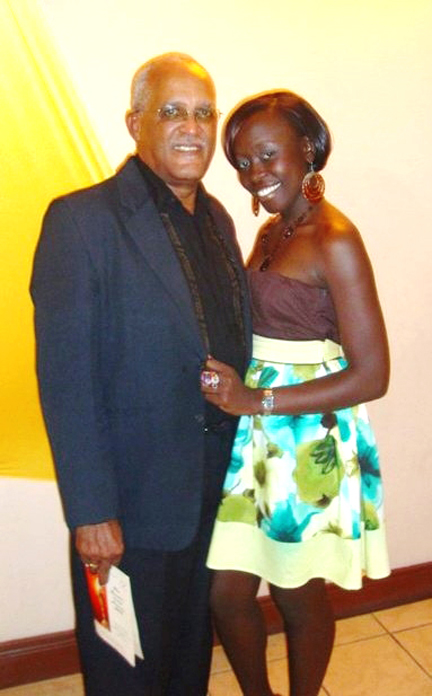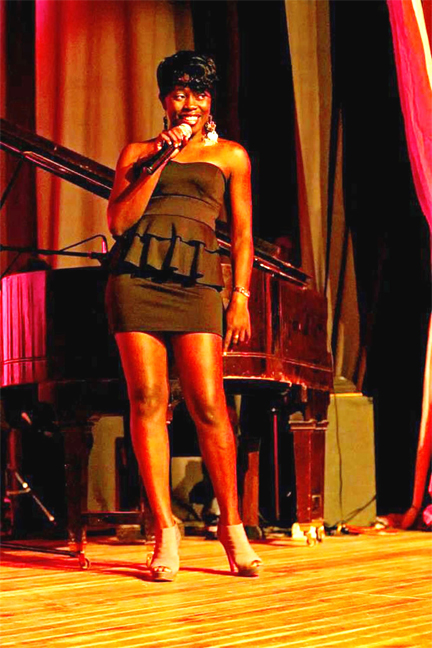Tashandra Inniss is the kind of person who never gives up on her passion. For her, the stage is her life, her language, her future. “Theatre is life. I love it. To be on stage helps you to express your feelings through… the movements of your body and facial expressions, it is body language and body art,” she said during an interview this week with The Scene.

Her play, Till Death, had stormed away with four 2012 National Drama Festival Awards including the Best Original Guyanese Play and Best production. Kijana Lewis was awarded Best Actor and Clemencio Goddette, Best Actress for their outstanding performances in the production.
Growing up in Vreed-en-Hoop, West Demerara provided the grooming for Tashandra’s artistic mind; the friendly people and the rural traditions were in their own way inspirational. Tashandra shared that the community was closely knit and “everyone knew everyone”. She was raised in a household with 15 family members—she is the last of five children—and together they would frolic and play in the yard, climbing jamoon and mango trees, pelting fruits, playing games and bathing at the pipe in the yard are all fond childhood memories.

It was while at high school on the West Demerara that her creativity flourished. She would write short stories and articles and share with her friends who took keen interest in her work.
She was always a lover of the English Language and majored in Secretarial Science, Intermediate and Advance typing and English at the Business School.
She joined the Theatre Guild after Carifesta 2008 and soon found her talents to be well favoured by experienced dramatists. She said there were countless times when she felt her own work was not up to standard. She would find herself less interested in the piece and wanting to give up the work. It was at times like these that she would be inspired by people like Ron Robinson, Dr Paloma Mohamed and her friend Tivia Collins, who serves as her critic.
Robinson, she says, “pushes me to the extent, always telling me not to limit myself to acting, that I can do so much more and that I should strive for it.”
She is motivated by something he says: “If you think you have done your best performance then you should give up acting because you’ve done it all. There is always more you can learn.”
She describes Mohamed as the smartest, strongest and most inspiring woman that she knows.
She says of Collins: “She has always been there to show me my mistakes; give me the knock over the head.”
And she takes pride in knowing that her family makes it a priority to attend all of her shows.
Tashandra considers her play Till Death to be her baby, her most proficient art to date. “I would say it is my most accomplished piece of work until the next one comes. Till Death is what I started with, that is what drives me to write more. The feedback was tremendous and I am overjoyed at the results. Right after I won those awards, I was like ‘I got to start working on my next piece, so that I create a masterpiece.’”
Apart from writing her own play for the 2012 National Drama Festival, Tashandra was the Production Manager for the play Sizwe Banzi is Dead. She was also cast as the lead in Mosa Telford’s award-winning play, Sauda.
For her, playing the 15-year-old character was her most challenging role to date. “It was totally different from what I would normally be doing. I am 26 years old and had to act as a flaunting teenager. When I left for rehearsals I had to remind myself that I am 15 years old so at rehearsals I would be skipping around stage. I had to shake my legs, move my hands and basically do everything girly.”
Apart from acting like a child, it was very difficult for Tashandra to take on the role as Sauda because of its focus on the issue of being black-skinned. “I had to put myself way back to when I as a scho

olgirl and children would be saying things like ‘Ey, you black skin girl’.
“To an extent, I felt hurt but overall I am comfortable in my own skin. Young black girls should learn to love themselves from early as possible. There is so much more than complexion. If you cut your skin it would be the same blood, you have to look beyond complexion.”
Her first major role was the character Mavis in Moon on a Rainbow Shawl. Over the years she has acted in the Link Show series, Somebody gon Horn yuh, Watch de Ride, Old Story Time and several other Theatre Guild productions.
She aims to write plays centred on critical social issues in the country, her next work will be focused on child prostitution and human trafficking.
“There is much more I can do and there is much more to learn. I think the best is to come. I still see myself writing, acting, directing and even helping out backstage is a pleasure! I love the art form, I love the stage life.”
Even though she thinks opening her own production company is a long shot towards the future, she still has her heart set on her goals since she is not the kind to give up.
Tashandra would like to see more street drama similar to what Merundoi does; she feels it can strengthen the art form. “I think street theatre is absolutely beautiful. It helps to get people more involved…”
Tashandra now resides in the capital with her family. She adores her nieces and nephews and shares their youthful joy. She works at the West Indian Sports Complex as a secretary and cashier and when she is not writing or rehearsing, she would enjoy a few drinks with her theatre family.




